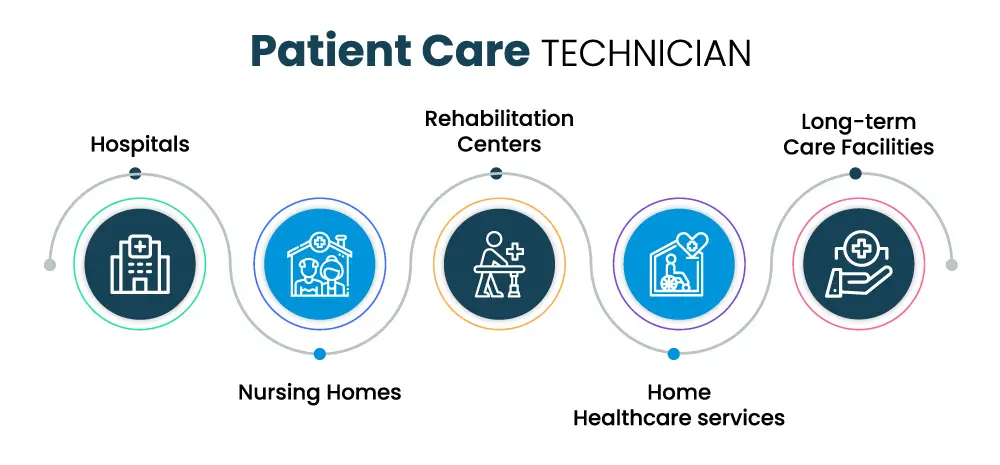
Value Based Healthcare Demystified: What You Should Know
Value Based Healthcare Demystified: What You Should Know Ever since the reform made by CMS in care models, one phrase that you may have heard

When it comes to healthcare, many people in the world immediately think of doctors and nurses. However, there are some unsung heroes who are not known by most in the healthcare system who play a critical role in the daily lives of patients: the Patient Care Technician (PCT).
From basic medical tasks to personal care, Patient Care Technicians serve as essential support to medical professionals. In this comprehensive blog, we’ll delve deep into the world of Patient Care Technicians, providing answers to frequently asked questions.
A Patient Care Technician is a healthcare professional responsible for assisting doctors, nurses, and other medical staff in the provision of patient care. They are considered to be part of the larger care team. They often work in diverse environments such as:

PCTs are in face-to-face contact with the patients aiding them in their routine tasks. Their tasks include but are not limited to taking vital signs, collecting samples, and assisting with hygiene needs.
What it takes to become a patient care technician is the most common question asked when someone is looking to pursue his or her career.
To become a Patient Care Technician, the first step is usually obtaining a high school diploma or GED. After that, the next logical step is to enroll in a specialized training program. Many vocational schools, community colleges, and even some hospitals offer programs designed to train individuals in the necessary skills to become proficient PCTs.
After completing your high school education, you’ll need to undergo specialized training. These programs vary in length but generally last between 8 to 12 months. The training often includes both theoretical coursework and practical, hands-on experience. After successfully completing your training, you’ll need to pass a certification exam to become a certified PCT. This exam usually covers a range of courses like basic anatomy, medical terminologies, pharmacology and physiology. Studying these courses helps the students to learn about skills related to:
Having the clinical experience is an extra plus for the students & many training programs offer externships to get the upper hand. Students get hands-on experience by implementing what they have learned in the classes. This will make them familiar with what duties they need to perform and will make them feel a bit comfortable when they are treating the patients.
There are a few nationally recognized organizations that offer certification exams for Patient Care Technicians:
National Healthcareer Association (NHA): Their CPCT/A exam is one of the most popular choices for aspiring Patient Care Technicians. This exam covers a wide array of topics, including patient care, safety protocols, and basic medical procedures.
American Medical Certification Association (AMCA): The AMCA’s Patient Care Technician Certification (PCTC) exam focuses on a variety of subjects from basic care to specific procedures like phlebotomy and EKGs.
National Center for Competency Testing (NCCT): They offer a Tech in Surgery – Certified (NCCT) TS-C exam that also credentials you as a Patient Care Technician, although it leans more towards surgical settings.
The timeline for becoming a Patient Care Technician depends on the specific program you choose. While most vocational programs last between 3 to 6 months, some may extend for up to a year, especially if they include extensive hands-on clinical experience. After your training, you’ll need to allocate time to prepare for and take the certification exam, which might add a few more weeks to your timeline.
Core Responsibilities
The role of a Patient Care Technician varies by the healthcare setting, but the core responsibilities often include:

Vital Signs: Monitoring and recording vital statistics such as blood pressure, temperature, and pulse.
Personal Care: Assisting patients with daily activities like bathing, eating, and getting dressed.
Sample Collection: Collecting samples for laboratory tests, including blood and urine samples.
Monitoring: Observing patient condition and reporting any changes to the nursing and medical staff.
Medical Procedures: Assisting during minor medical procedures, such as catheter insertion or wound dressing.
In addition to the technical and clinical skills acquired through education and certification, a Patient Care Technician (PCT) also needs a range of soft skills and personal qualities to excel in their role. Here are some of the important ones:
PCTs interact with patients, families, and healthcare professionals daily. Effective communication is essential to relay information accurately, manage patient expectations, and collaborate with healthcare teams.
Patients may be experiencing pain, stress, or anxiety. Empathy and compassion help PCTs offer emotional support and understand the patients’ needs and concerns, thereby improving the overall quality of care.
Whether it’s monitoring vital signs or administering medication, a minor mistake can have serious repercussions. PCTs must pay close attention to details to ensure patient safety and effective care.
When it comes to salary, a Patient Care Technician’s earning potential varies based on a range of factors, including location, level of experience, and the type of healthcare setting. According to the U.S. Bureau of Labor Statistics, the median annual wage for PCTs falls between $30,000 to $50,000 per year. However, those with additional certifications and years of experience can expect a higher salary, sometimes exceeding $50,000 annually.
Earning a certification can boost your career in multiple ways. Not only does it make you more employable, but it also often translates into a higher salary. A Certified Patient Care Technician has undergone specialized training and successfully passed a national certification exam, making them highly competent in their role.
| Features | PCT | CNA |
|---|---|---|
| Scope of Practice | Broader scope, including phlebotomy, EKGs, and sometimes basic wound care | Limited to basic patient care like bathing, feeding, and transferring patients |
| Educational Requirements | Specialized training programs, usually 3-12 months | State-approved CNA training programs, usually 4-12 weeks |
| Certification | Optional but preferred, such as CPCT/A from NHA | Mandatory in most states |
| Clinical Experience | More extensive hands-on training, often including clinical rotations | Typically involves fewer clinical hours and less diversity in procedures |
| Work Settings | Hospitals, nursing homes, rehab centers, clinics, and even home healthcare | Primarily nursing homes, but also hospitals and home healthcare |
| Technical Skills | Blood draws, setting up and monitoring EKGs, catheter care | Primarily basic care tasks like measuring vital signs |
| Salary | Generally higher due to more specialized skills | Generally lower because of a more limited scope of practice |
The Patient Care Technician plays an irreplaceable role in the healthcare ecosystem. With their wide range of responsibilities and the vital support they offer to medical staff, PCTs are integral in providing high-quality care to patients. If you’re looking for a fulfilling, dynamic career in healthcare, becoming a Patient Care Technician offers both challenges and rewards. With relatively short training periods and plenty of room for career advancement, it’s an option worth considering for anyone interested in healthcare.
So now you know what a Patient Care Technician is, what they do, how to become one, and the differences between a PCT and a CNA. With this wealth of information, you’re well-equipped to decide if a career as a Patient Care Technician is the right fit for you.

Value Based Healthcare Demystified: What You Should Know Ever since the reform made by CMS in care models, one phrase that you may have heard

RPM and IoMT – The Dynamic Duo Transforming Healthcare Delivery The landscape of healthcare delivery is undergoing a profound transformation, driven by the synergistic power
Talk to an Expert Now